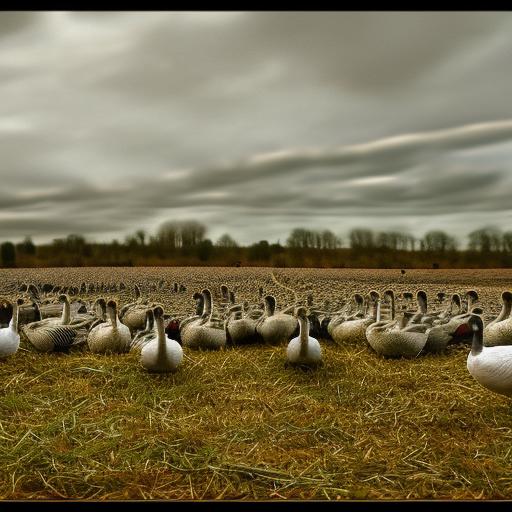Geese farming has a long and rich history, dating back thousands of years. The domestication of geese is believed to have originated in ancient Egypt, where they were raised for their meat, feathers, and down. Over time, geese farming spread to other parts of the world, including Europe and Asia. Today, geese are commonly raised on farms for various purposes, including meat production, egg production, and weed control.
There are several types of geese that are commonly raised on farms. The most popular breeds include the Toulouse, Embden, and Chinese breeds. These breeds are known for their large size and high meat production. Other breeds, such as the African and Pilgrim geese, are smaller in size and are often raised for their eggs or as pets. Each breed has its own unique characteristics and is suited to different farming practices.
Key Takeaways
- Geese farming is a low-maintenance and sustainable livestock option for farmers.
- Geese can serve as natural pest control agents on the farm.
- Keeping geese can provide farmers with a source of income and food for their families.
- Geese can help diversify a farm’s offerings and play a role in traditional farming practices.
- Despite modern advancements, farmers continue to keep geese for their many benefits.
Benefits of keeping geese on the farm
One of the main benefits of keeping geese on the farm is that they are hardy and adaptable to different climates. Geese can withstand cold temperatures and can graze on pasture during the warmer months. They require minimal shelter and can thrive in a variety of environments. This makes them an ideal choice for farmers who may not have access to expensive infrastructure or who live in areas with harsh weather conditions.
Another benefit of raising geese is that they are social animals and can be raised in flocks. Geese are known for their strong social bonds and will often form close-knit groups. This makes them easy to manage and care for on the farm. Additionally, raising geese in flocks can provide a sense of companionship for the animals, which can contribute to their overall well-being.
Geese as natural pest control agents
Geese are excellent natural pest control agents. They have a voracious appetite and can eat a wide variety of insects, weeds, and other pests. This can help reduce the need for chemical pesticides on the farm, making geese a more sustainable and environmentally friendly option. In addition to insects and weeds, geese are also known for their ability to control snail and slug populations. These pests can be detrimental to crops, so having geese on the farm can help protect plants and increase yields.
Geese as a source of income for farmers
Geese can be a profitable addition to a farm’s offerings. They can be sold for meat, feathers, and down, providing multiple income streams for farmers. Goose meat is highly sought after for its rich flavor and lean protein content. Feathers and down can be used in various industries, including bedding, clothing, and upholstery. Additionally, geese can be used for weed control services. Some farmers offer their geese to other farmers or landowners to help control weeds on their properties. This can be a lucrative business opportunity for farmers who have a large flock of geese.
Geese as a source of food for farmers and their families
In addition to being a source of income, geese can also provide food for farmers and their families. Goose meat is considered a delicacy in many cultures and is known for its rich flavor. It is also a lean protein source, making it a healthy choice for those looking to incorporate more protein into their diet. Geese can also provide eggs for consumption. Goose eggs are larger than chicken eggs and have a rich flavor that is prized by many. Raising geese for food can be a sustainable and ethical choice, as they require minimal resources compared to other livestock options.
Geese as a low-maintenance livestock option

Geese are known for their low-maintenance nature, making them an attractive option for farmers with limited resources or time. They require minimal care and can be raised alongside other livestock, such as chickens or goats. Geese do not require expensive feed or housing, as they can graze on pasture and forage for their own food. They are also hardy animals that can withstand harsh weather conditions, reducing the need for additional shelter or heating. This makes geese a cost-effective and low-maintenance livestock option for farmers.
Geese as a sustainable farming practice
Raising geese can help reduce the environmental impact of farming. Geese can help control pests without the use of chemical pesticides, reducing the amount of harmful substances that are released into the environment. Additionally, geese can be raised on pasture, reducing the need for feed crops. This can help conserve land and resources, making geese a more sustainable choice for farmers. By incorporating geese into their farming practices, farmers can contribute to a more environmentally friendly and sustainable agricultural system.
Geese as a way to diversify a farm’s offerings
Adding geese to a farm can help attract new customers and diversify a farm’s offerings. Geese can be used for meat, eggs, and weed control services, providing multiple products and services that can appeal to different customer segments. By diversifying their offerings, farmers can increase their revenue and sustainability. Additionally, offering unique products and services can help differentiate a farm from its competitors and attract new customers who are looking for high-quality and sustainable options.
The role of geese in traditional farming practices
Geese have played an important role in traditional farming practices for centuries. They have been raised for food, feathers, and down in many cultures around the world. In some cultures, geese have also been used for weed control, as their grazing habits can help keep weeds in check. Additionally, geese have been used as guard animals to protect other livestock from predators. Their loud honking and aggressive behavior towards intruders make them effective deterrents against potential threats. The long history of geese in traditional farming practices is a testament to their versatility and usefulness on the farm.
Why farmers continue to keep geese today
In conclusion, geese farming offers numerous benefits for farmers. Geese are hardy and adaptable to different climates, making them a low-maintenance livestock option. They can provide income through the sale of meat, feathers, and down, as well as through weed control services. Geese can also provide food for farmers and their families, offering a sustainable and ethical protein source. By incorporating geese into their farming practices, farmers can contribute to a more sustainable and environmentally friendly agricultural system. Overall, geese farming is a versatile and profitable option for farmers looking to diversify their offerings and increase their revenue.
If you’re curious about why farmers keep geese, you might also be interested in learning about the natural hatching process of chicken eggs. Understanding how long it takes for chicken eggs to hatch naturally can provide valuable insights into the breeding and incubation practices of poultry farmers. To delve deeper into this topic, check out this informative article on how long for chicken eggs to hatch naturally. It’s a fascinating read that sheds light on the intricacies of poultry farming and the delicate balance required for successful egg hatching.
FAQs
What are geese?
Geese are waterfowl birds that belong to the family Anatidae. They are known for their long necks, webbed feet, and loud honking calls.
Why do farmers keep geese?
Farmers keep geese for a variety of reasons. Geese are excellent at controlling pests such as snails, slugs, and insects. They also provide meat, eggs, and feathers. Additionally, geese are good at guarding other farm animals and can alert farmers to potential threats.
What are the benefits of keeping geese on a farm?
Keeping geese on a farm can provide several benefits. They can help control pests, provide meat, eggs, and feathers, and act as guard animals. Geese are also relatively low-maintenance and can thrive in a variety of environments.
What are some challenges of keeping geese on a farm?
One challenge of keeping geese on a farm is their tendency to be noisy and aggressive, especially during breeding season. They can also be messy and require adequate space to roam and graze. Additionally, geese can be susceptible to certain diseases and parasites.
What are some common breeds of geese kept on farms?
Some common breeds of geese kept on farms include Toulouse, Embden, and Chinese geese. These breeds are known for their meat and egg production, as well as their ability to act as guard animals.
Meet Walter, the feathered-friend fanatic of Florida! Nestled in the sunshine state, Walter struts through life with his feathered companions, clucking his way to happiness. With a coop that’s fancier than a five-star hotel, he’s the Don Juan of the chicken world. When he’s not teaching his hens to do the cha-cha, you’ll find him in a heated debate with his prized rooster, Sir Clucks-a-Lot. Walter’s poultry passion is no yolk; he’s the sunny-side-up guy you never knew you needed in your flock of friends!







